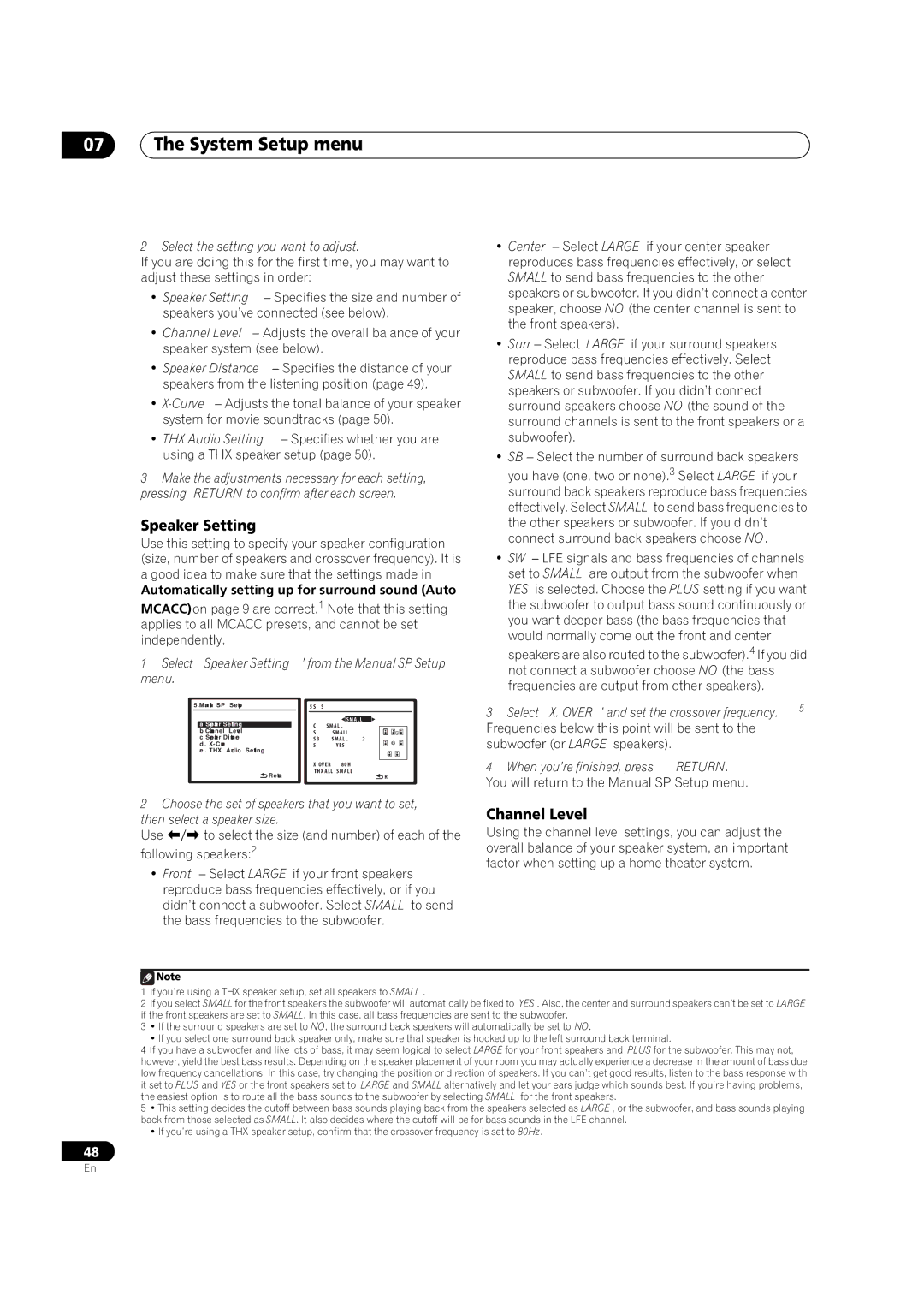
07The System Setup menu
2 Select the setting you want to adjust.
If you are doing this for the first time, you may want to adjust these settings in order:
•Speaker Setting – Specifies the size and number of speakers you’ve connected (see below).
•Channel Level – Adjusts the overall balance of your speaker system (see below).
•Speaker Distance – Specifies the distance of your speakers from the listening position (page 49).
•
•THX Audio Setting – Specifies whether you are using a THX speaker setup (page 50).
3Make the adjustments necessary for each setting, pressing RETURN to confirm after each screen.
Speaker Setting
Use this setting to specify your speaker configuration (size, number of speakers and crossover frequency). It is a good idea to make sure that the settings made in Automatically setting up for surround sound (Auto
MCACC) on page 9 are correct.1 Note that this setting applies to all MCACC presets, and cannot be set independently.
1Select ‘Speaker Setting’ from the Manual SP Setup menu.
5.Manual SP | Setup |
| 5a.Speaker | Setting | |||||||
|
|
|
|
| Front |
|
|
|
|
|
|
|
|
|
|
|
| SMALL | |||||
| a . Speaker | Setting |
|
| Center | [ | SMALL | ] |
| ||
| b . Channel | Level |
| Surr |
| [ SMALL ] |
| ||||
| c . Speaker | Distance |
| SB | [ SMALLx2 ] | ||||||
| d . |
|
|
| SW | [ |
|
| YES ] | ||
| e . THX Audio Setting |
|
|
|
|
|
|
|
| ||
|
|
|
|
| X. OVER | [ | 80Hz] | ||||
|
| :Return |
| (THX:ALL | SMALL ) | ||||||
|
|
|
|
|
|
|
|
| :Return | ||
2Choose the set of speakers that you want to set,
then select a speaker size.
Use / to select the size (and number) of each of the following speakers:2
•Front – Select LARGE if your front speakers reproduce bass frequencies effectively, or if you didn’t connect a subwoofer. Select SMALL to send the bass frequencies to the subwoofer.
•Center – Select LARGE if your center speaker reproduces bass frequencies effectively, or select SMALL to send bass frequencies to the other speakers or subwoofer. If you didn’t connect a center speaker, choose NO (the center channel is sent to the front speakers).
•Surr – Select LARGE if your surround speakers reproduce bass frequencies effectively. Select SMALL to send bass frequencies to the other speakers or subwoofer. If you didn’t connect surround speakers choose NO (the sound of the surround channels is sent to the front speakers or a subwoofer).
•SB – Select the number of surround back speakers you have (one, two or none).3 Select LARGE if your surround back speakers reproduce bass frequencies effectively. Select SMALL to send bass frequencies to the other speakers or subwoofer. If you didn’t connect surround back speakers choose NO.
•SW – LFE signals and bass frequencies of channels set to SMALL are output from the subwoofer when YES is selected. Choose the PLUS setting if you want the subwoofer to output bass sound continuously or you want deeper bass (the bass frequencies that would normally come out the front and center speakers are also routed to the subwoofer).4 If you did not connect a subwoofer choose NO (the bass frequencies are output from other speakers).
3Select ‘X. OVER’ and set the crossover frequency.5 Frequencies below this point will be sent to the subwoofer (or LARGE speakers).
4When you’re finished, press RETURN.
You will return to the Manual SP Setup menu.
Channel Level
Using the channel level settings, you can adjust the overall balance of your speaker system, an important factor when setting up a home theater system.
![]() Note
Note
1If you’re using a THX speaker setup, set all speakers to SMALL.
2If you select SMALL for the front speakers the subwoofer will automatically be fixed to YES. Also, the center and surround speakers can’t be set to LARGE if the front speakers are set to SMALL. In this case, all bass frequencies are sent to the subwoofer.
3• If the surround speakers are set to NO, the surround back speakers will automatically be set to NO.
•If you select one surround back speaker only, make sure that speaker is hooked up to the left surround back terminal.
4If you have a subwoofer and like lots of bass, it may seem logical to select LARGE for your front speakers and PLUS for the subwoofer. This may not, however, yield the best bass results. Depending on the speaker placement of your room you may actually experience a decrease in the amount of bass due low frequency cancellations. In this case, try changing the position or direction of speakers. If you can’t get good results, listen to the bass response with it set to PLUS and YES or the front speakers set to LARGE and SMALL alternatively and let your ears judge which sounds best. If you’re having problems, the easiest option is to route all the bass sounds to the subwoofer by selecting SMALL for the front speakers.
5• This setting decides the cutoff between bass sounds playing back from the speakers selected as LARGE, or the subwoofer, and bass sounds playing back from those selected as SMALL. It also decides where the cutoff will be for bass sounds in the LFE channel.
•If you’re using a THX speaker setup, confirm that the crossover frequency is set to 80Hz.
48
En
